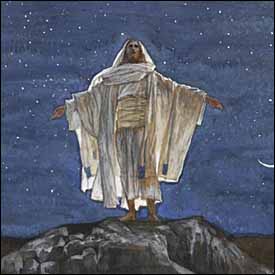
|
Old Testament
New Testament
Gospels
Acts
Paul's Letters
General Letters
Revelation
Topical Studies
Beginning the Journey (for new Christians). en Español

|
Old Testament
New Testament
Gospels
Acts
Paul's Letters
General Letters
Revelation
Topical Studies

|
Home
Bible Studies
Articles
Books
Podcasts
Search
Menu
Donate
About Us
Contact Us
FAQ
Sitemap
Appendix 2D. The Son of Man
 James J. Tissot, detail of 'Jesus Goes Up Alone onto a Mountain to Pray' (1886-94), gouache on gray wove paper, Brooklyn Museum, New York. |
Luke 5:24 is the first time in Luke's Gospel that Jesus uses his favorite self-designation, "Son of Man," which he uses a total of 25 times in this Gospel. He doesn't declare himself to be the "Son of God" or "Messiah," though he acknowledges both of those titles at his mock trial just before he is crucified (Luke 22:66-71). Son of Man is what he calls himself. Why?
"Son of God" was tantamount to declaring himself equal with God (John 5:16-18). If he had proclaimed this truth early in his ministry, his teaching ministry would have been cut short and he would have been crucified even sooner by the incensed religious leaders.
"Messiah" or "Christ" (the Greek translation of "messiah") had explosive political connotations. In Jesus' day there was a very strong expectation for the Messiah to come and deliver Israel from her oppressors. If Jesus had openly declared himself as Messiah, his ministry would have become politicized, people would follow him as part of a nationalistic rather than spiritual cause, and the Romans would have disposed of him quickly.
"Son of Man," however, wasn't nearly as laden with religious or political baggage. The phrase appears 100 times in the Old Testament, 93 of them in Ezekiel as a synonym for "man." Apparently, the reason Jesus used this as his self-designation was because of its reference in Daniel 7, especially verse 19, that Jesus quoted at his mock trial (Luke 22:66-71). Read the larger context in Daniel 7 and you see glimpses of the heavenly throne room as portrayed in Revelation 20:11ff.
"As I looked,
thrones were set in place,
and the Ancient of Days took his seat.
His clothing was as white as snow;
the hair of his head was white like wool.
His throne was flaming with fire,
and its wheels were all ablaze.
A river of fire was flowing,
coming out from before him.
Thousands upon thousands attended him;
ten thousand times ten thousand stood before him.
The court was seated,
and the books were opened...."
(Daniel 7:9-10)
"In my vision at night I looked, and there before me was one like a son of man, coming with the clouds of heaven. He approached the Ancient of Days and was led into his presence. He was given authority, glory and sovereign power; all peoples, nations and men of every language worshiped him. His dominion is an everlasting dominion that will not pass away, and his kingdom is one that will never be destroyed." (Daniel 7:13-14)
The Ancient of Days, of course, is God the Father. The Son of Man is Jesus who is granted authority, glory, power, worship, and an everlasting Kingdom. These themes are woven throughout the New Testament in the Kingdom of God, the Exalted Servant (Philippians 2:9-11), culminating in the book of Revelation.
 Lessons compiled in 805-page book in paperback, Kindle, & PDF. |
The term "Son of Man" has much rich meaning, but was used enough times in the Old Testament as a synonym for "man" that neither Jesus' supporters or enemies could seize upon it to subvert the course of Jesus' ministry as they might have with the terms "Son of God" or "Messiah."
Copyright © 2026, Ralph F. Wilson. <pastor![]() joyfulheart.com> All rights reserved. A single copy of this article is free. Do not put this on a website. See legal, copyright, and reprint information.
joyfulheart.com> All rights reserved. A single copy of this article is free. Do not put this on a website. See legal, copyright, and reprint information.


 To be notified about future articles, stories, and Bible studies, why don't you subscribe to our free newsletter, The Joyful Heart, by placing your e-mail address in the box below. We respect your
To be notified about future articles, stories, and Bible studies, why don't you subscribe to our free newsletter, The Joyful Heart, by placing your e-mail address in the box below. We respect your